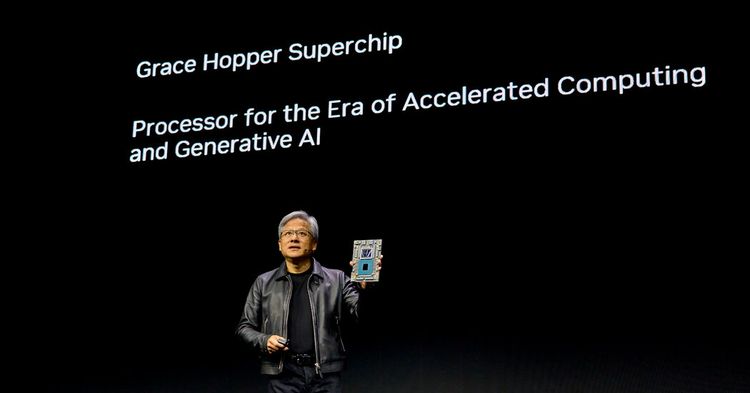Nvidia Revenue Doubles on Demand for A.I. Chips, and Could Go Higher

The company, which produces chips crucial for the advancement of artificial intelligence systems, stated that their sales for the present quarter are projected to increase almost threefold in comparison to the previous year's total.

On August 23rd, 2023 at 4:47 p.m. Eastern Time,
As a signal of the progressing surge in the tech industry, Nvidia projected a swift expansion in the existing fervent need for its chips used for constructing artificial intelligence systems.
The products made by the company based in Silicon Valley, known as graphics processing units (GPUs), are essential for developing most artificial intelligence (A.I.) systems, including the highly favored ChatGPT chatbot. Numerous tech firms, varying from small startups to the biggest players in the industry, are engaged in a fierce competition to acquire these valuable assets.
Nvidia announced that its revenue for the second quarter, concluding in July, increased by 101% compared to the same period last year, reaching $13.5 billion. The considerable surge in profit was even more impressive, rising by over nine times to nearly $6.2 billion. This remarkable growth can be attributed to the high demand for chips necessary to fuel A.I. systems from various sources, including cloud computing services and other clients.
This performance exceeded Nvidia's expectations, which had already surprised investors in May with a projected revenue of $11 billion for the quarter. This remarkable achievement led to Nvidia's market value surpassing $1 trillion for the very first time.
Nvidia's forecast and impressive market value became a representation of the increasing enthusiasm surrounding artificial intelligence, which is revolutionizing various computer systems and their programming methods. This also significantly piqued curiosity about Nvidia's future statements regarding the need for computer chips in the ongoing quarter, concluding in October.
Nvidia predicted that their sales in the third quarter would reach $16 billion, a figure almost three times higher than the previous year. This also surpassed the average predictions of analysts by a substantial $3.7 billion, which were around $12.3 billion.
The economic success of chip manufacturers is frequently seen as a predictor for the overall technology sector, and Nvidia's impressive outcomes may revive excitement for technology stocks in the financial district. While other technology firms such as Google and Microsoft are investing significant amounts of money into artificial intelligence without yielding substantial profits, Nvidia is capitalizing on the situation.
Jensen Huang, the CEO of Nvidia, stated that prominent cloud services and other corporations were making substantial investments to introduce Nvidia's artificial intelligence technology in all sectors. In his prepared statement, he emphasized the commencement of a fresh era in computing.
Nvidia's stock price rose by over 8 percent during after-hours trading.
Up until now, Nvidia primarily made money by selling GPUs for rendering graphics in video games. However, in 2012, A.I. scientists began utilizing these chips for machine learning purposes, which Nvidia cleverly capitalized on by improving their GPUs and developing various software solutions to minimize the workload for A.I. developers.
The sales of chips dedicated to data centers, where the majority of artificial intelligence (A.I.) training takes place, have become the primary source of revenue for the company. Nvidia disclosed that the revenue generated from this sector experienced an impressive growth of 171 percent, reaching $10.3 billion in the second quarter.
According to Patrick Moorhead, an expert at Moor Insights & Strategy, there is a strong urgency among top executives and boards of directors to incorporate generative A.I. capability into their businesses. However, the current obstacle faced by Nvidia is the scarcity of chips, which could potentially open doors for established chip companies like Intel and Advanced Micro Devices, as well as emerging players like Groq.
Nvidia's impressive sales stood in stark contrast with the financial difficulties faced by other companies in the chip industry. These companies have been negatively impacted by the weak demand for personal computers and data center servers utilized for various tasks. Intel, for instance, reported a 15 percent decrease in revenue for the second quarter, although it exceeded the expectations of the stock market. Meanwhile, Advanced Micro Devices experienced an even greater decline in revenue, with a substantial 18 percent drop during the same period.
Certain experts argue that the allocation of funds towards specialized artificial intelligence hardware, like Nvidia's chips and the corresponding systems, is diverting financial resources from other data center infrastructure investments. According to IDC, a renowned market research company, cloud service providers are projected to surge their expenditure on server systems dedicated to AI by 68 percent within the subsequent five years.
The H100, a recently released graphics processing unit (GPU) intended for artificial intelligence (A.I.) purposes, is facing an exceptionally high level of demand. Since its launch in September, businesses of all sizes have been urgently seeking out available stocks of this cutting-edge chip. The manufacturing process for these chips is highly advanced, involving intricate packaging that merges GPUs with unique memory chips.
Nvidia's capacity to enhance shipments of the H100 is primarily associated with the measures taken by Taiwan Semiconductor Manufacturing Company, undertaking both the wrapping process and the production of the GPUs.
Business leaders anticipate a continuous scarcity of H100s in the market until 2024. This poses a considerable challenge for artificial intelligence (A.I.) start-ups and cloud service providers aiming to offer innovative computing solutions that make use of these advanced graphics processing units (GPUs).





